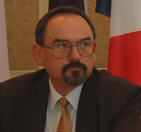The Balkans, Afghanistan, and the Control of Nuclear Armaments
Ambassador Jaromir Novotny
Czech Ambassador to India
 |
Ambassador Jaromir Novotny "Afghanistan looks...like a forgotten war. Karzai has control only over Kabul and only during the day. Warlords continue to keep their private armies. Drug production is at a record level, with an estimated value of U.S. $25 billion." |
OPENING REMARKS
It is difficult to speak on the last day of the workshop, when almost everything has been said. We have heard how successful we are in the Balkans, how smoothly NATO and EU enlargement are progressing, how the general situation in Europe is quite good, how cooperation between the West and Russia is on the right path, how the situation in Iraq is not ideal but will be better, and how we are doing well so far in Afghanistan. I would like to make some remarks that go in a slightly different direction.
CURRENT ISSUES IN THE BALKANS
I do not agree that we are truly successful in the Balkans. What have we achieved after more than 15 years of engagement? Yes, the people of Bosnia, Kosovo, and Serbia have stopped killing each other, and this is a success. But what else have we achieved? We have not solved the basic problem: the statehood of these territories has not been defined. We have created two international protectorates (Bosnia and Herzegovina, and Kosovo) and one artificial state called Serbia and Montenegro, which their inhabitants do not like. We have given them deadlines to solve their problems, but they have all been postponed. And Bosnian politicians, like their counterparts in Kosovo and Serbia and Montenegro, are now going ahead only because of heavy pressure from the international community.
The last ethnic riots in Kosovo have shown us what Kosovars think about human rights. The international structures in Kosovo were surprised and completely unprepared for the eruption of atrocities. Kosovo is actually governed by local mafia organizations, and the society there is one of the most corrupt in the world. To make matters even worse, the international organizations in Kosovo are becoming more and more corrupt as well.
What is the future for Kosovo? What are we proposing to its inhabitants? Are the people there still part of Serbia and Montenegro, which, according to all valid U.N. resolutions, they are? Is Kosovo a territory with special status, different currency, a different system of taxation and law, protected by the U.N. and on the path to independence? Or will Kosovo be united with Albania? Nobody is prepared to define its future status.
Bosnia and Herzegovina is another difficult situation. It is an international protectorate that consists of two state entities (perhaps three—what is the status of Brcko?) and three national entities. The Dayton Agreement froze all its problems, making the main obstacle to progress the relationships inside. This protectorate is also corrupt at all levels of society.
There, as well as in Kosovo, the very fragile peace cannot be sustained without huge financial support from the international community and without a visible military presence. How long will our countries be ready to pay for it?
Serbia and Montenegro were forced together. The deadline for solving the problems of their being together is 2005. But in the time they have had so far, nothing has happened. They have two different economic systems, and they use two different currencies. Next year shall we give them another deadline? We are not solving the problems, we are only postponing the solutions with more deadlines. In fact we are preserving the status quo. But for how long?
THE “FORGOTTEN WAR” IN AFGHANISTAN
Afghanistan looks to me like a forgotten war. Karzai has control only over Kabul and only during the day. Warlords continue to keep their private armies. Drug production is at a record level, with an estimated value of U.S. $25 billion. Do we have this amount of money to replace the warlords’ profits? Some are saying that nobody is rich enough to buy Afghanistan. The warlords are on your side only until the moment they are paid, and if somebody offers them more, they will be loyal to him.
THE NEED FOR NUCLEAR ARMAMENT CONTROL
It is a great paradox that the nuclear armaments control mechanism has been the only victim of the end of the Cold War. At the close of the 1990s, nuclear states other than the U.S. and Russia had only 5 percent of the nuclear arsenals. Today they have 20 percent, and during the next 10 years they will have 60 to 70 percent. But no one is interested in this. No one is counting how many nuclear players we have now. The public was much more interested in this issue 10 years ago, but now it is not. And the U.S. and Russia aren’t interested in each other’s arsenal either. Their interest is on the same level as France’s interest in the nuclear arsenal of the U.K. But both powers, the U.S. and Russia, will have to renovate, change, and modernize their nuclear arsenals during the next few years, because, due to their age, they are becoming obsolete.
Today we have no effective international agreement that acts as a nuclear armaments control mechanism. And if we cannot satisfactorily solve the problems of the nuclear programs of North Korea and Iran, then we can expect to see an eruption of efforts to obtain nuclear arms, from Japan to Saudi Arabia.
